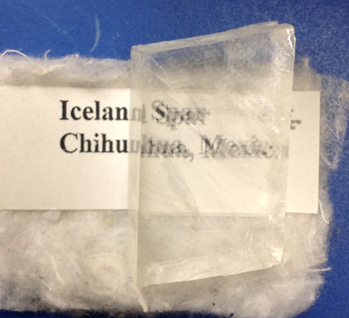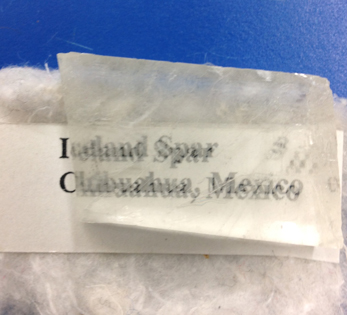|
Size: 1584
Comment:
|
Size: 2279
Comment:
|
| Deletions are marked like this. | Additions are marked like this. |
| Line 2: | Line 2: |
| ||<:30%>[[PiraScheme#Mechanics| Table of Mechanics Demonstration]]||<:30%>[[MEEquipmentList| List of Mechanics Equipment & Supplies]]||<:30%>[[Demonstrations|Lecture Demonstrations]]|| | ||<30% style="text-align:center">[[PiraScheme#Mechanics|Table of Mechanics Demonstration]] ||<30% style="text-align:center">[[MEEquipmentList|List of Mechanics Equipment & Supplies]] ||<30% style="text-align:center">[[Demonstrations|Lecture Demonstrations]] || |
| Line 5: | Line 6: |
| '''Topic and Concept:''' | |
| Line 6: | Line 8: |
| '''Topic and Concept:''' Birefringence, [[Polarization#Birefringence| 6H35. Birefringence]] |
. Birefringence, [[Polarization#Birefringence|6H35. Birefringence]] |
| Line 10: | Line 11: |
| * '''Cabinet:''' [[MechanicsCabinet|Mechanic (ME)]] * '''Bay:''' [[MechanicsCabinetBayA1|(A1)]] * '''Shelf:''' #1,2,3.. |
|
| Line 14: | Line 12: |
| attachment: mainPhoto | * '''Cabinet:''' [[Optics|Optics (OP)]] * '''Bay:''' [[OpticsCabinetBayA1|(A1)]] * '''Shelf:''' #1 {{attachment:CalciteView1A.jpg}} {{attachment:CalciteView1PlusPiOver2A.jpg}} |
| Line 18: | Line 19: |
| Insert succinct description of demonstration. | Rotate crystal of calcite (also known as Iceland Spar) above printed text. Two images are visible; one remains fixed as the crystal is rotated, the other circumnavigates the first. |
| Line 20: | Line 21: |
| ||<:style="width: 60%" :40%>'''Equipment'''||<:30%>'''Location'''||<:25%>'''ID Number'''|| | In the above left picture, see the "S" in "Spar" forms two images, which lie on a diagonal line running from upper left to lower right. In the above right picture, the two images of the "S" now lie on a diagonal line running from upper right to lower left. The fixed image is due to the so-called "ordinary" ray. The mobile image is due to the so-called "extraordinary" ray. (It's not easy to tell in the above pictures which image is fixed and which is mobile). If a linear polarizer is available, it can be used to show that each ray is polarized, and that the angles of polarization of the two rays differ by 90°. ||<40% style="text-align:center">'''Equipment''' ||<30% style="text-align:center">'''Location''' ||<25% style="text-align:center">'''ID Number''' || |
| Line 22: | Line 31: |
| ||apparatus||[[MechanicsCabinetBayB1| ME, Bay B1, Shelf #2]]|| || ||all other parts||[[MechanicsCabinetBayB1| ME, Bay B1, Shelf #2]]|| || ||...||[[MechanicsCabinetBayA5| ME, Bay A5, Shelf #2]]|| || |
||Calcite crystal ||[[OpticsCabinetBayA1|OP, Bay A1, Shelf #1]] || || ||Linear Polarizer ||[[OpticsCabinetBayB5|OP, Bay B5, Shelf #2]] || || |
| Line 27: | Line 35: |
| '''''Important Setup Notes:''''' * ''''' ''''' |
'''Discussion:''' The mathematical description of birefringence seems too advanced for an introductory course, however the demonstration may catch students' interest. |
| Line 31: | Line 41: |
| '''Setup and Procedure:''' 1. List steps for setup then procedure. 1. ... '''Cautions, Warnings, or Safety Concerns:''' * '''Discussion:''' Discuss the physics behind the demonstration, explaining some of the various steps of the demonstration when appropriate. ||attachment: photo||attachment: photo||attachment: photo||attachment: photo|| |
|
| Line 47: | Line 43: |
| Line 51: | Line 48: |
| * List any references |
* Hyperphysics http://hyperphysics.phy-astr.gsu.edu/hbase/phyopt/biref.html |
Double Refraction in Calcite, 6H35.15
Topic and Concept:
Birefringence, 6H35. Birefringence
Location:
Cabinet: Optics (OP)
Bay: (A1)
Shelf: #1


Abstract:
Rotate crystal of calcite (also known as Iceland Spar) above printed text. Two images are visible; one remains fixed as the crystal is rotated, the other circumnavigates the first.
In the above left picture, see the "S" in "Spar" forms two images, which lie on a diagonal line running from upper left to lower right.
In the above right picture, the two images of the "S" now lie on a diagonal line running from upper right to lower left.
The fixed image is due to the so-called "ordinary" ray. The mobile image is due to the so-called "extraordinary" ray. (It's not easy to tell in the above pictures which image is fixed and which is mobile).
If a linear polarizer is available, it can be used to show that each ray is polarized, and that the angles of polarization of the two rays differ by 90°.
Equipment |
Location |
ID Number |
|
|
|
Calcite crystal |
|
|
Linear Polarizer |
|
Discussion:
The mathematical description of birefringence seems too advanced for an introductory course, however the demonstration may catch students' interest.
Videos:
References: